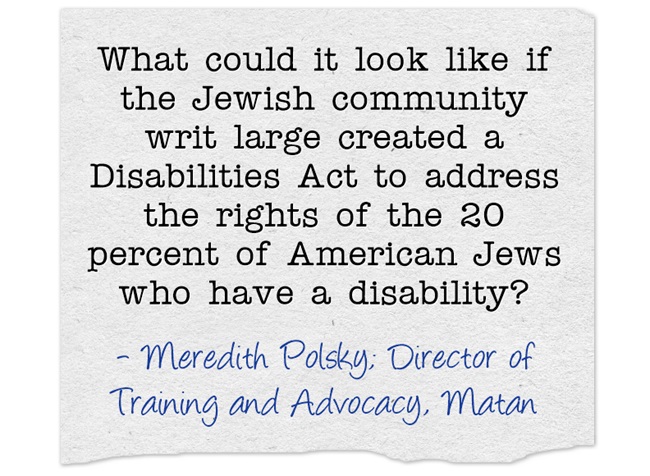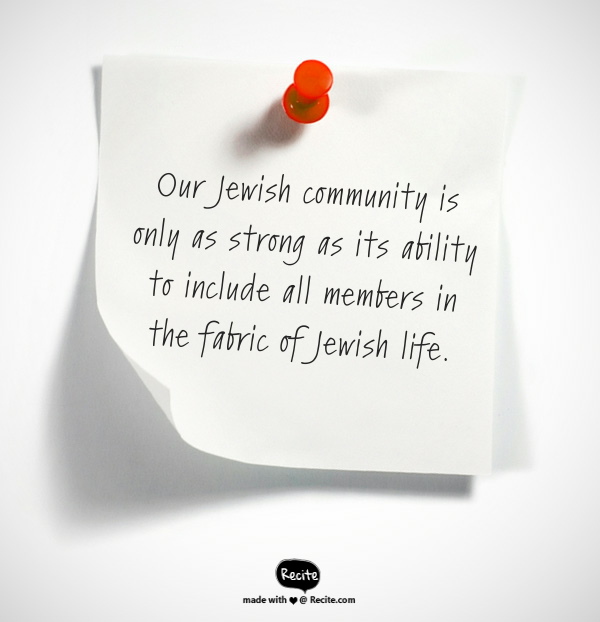The following post, written by Meredith Polsky, originally ran on the New Normal Blog.
 If you have been following The New Normal, or mainstream media, or even happened to do a web search on July 26th when the “Google Doodle” commemorated this day in history, you undoubtedly already know that we’ve recently marked the 25th anniversary of the Americans with Disabilities Act (ADA).
If you have been following The New Normal, or mainstream media, or even happened to do a web search on July 26th when the “Google Doodle” commemorated this day in history, you undoubtedly already know that we’ve recently marked the 25th anniversary of the Americans with Disabilities Act (ADA).
What could it look like if the Jewish community writ large created a Disabilities Act to address the rights of the 20 percent of American Jews who have a disability?
True, we often bemoan the fact that the Jewish community lags behind when it comes to “equal rights” for people with and without disabilities. But 25 years is not a long time in the history of our country, and an even shorter amount of time in the history of the Jewish people. With that in mind, I choose optimism: There is time for us to catch up!
The Americans with Disabilities Act gives civil rights protections to the 56.7 million individuals with disabilities (19 percent of the American population) and covers five areas: Employment, Public Accommodations, Transportation, State and Local Government Operations and Telecommunications Relay Services. While religious organizations are not obligated by this public law (ironic, since the law is modeled after protections provided to individuals on the basis of religion, among other things), many of us working towards Jewish inclusion often talk about a “moral obligation.” How could we better address the needs of these 1.1 million Jews who have a disability? What would our five main categories be?
1. Spiritual Access: For my house shall be a house of prayer for all people. (Isaiah, 56:5)
Studies show that disability and spirituality are intricately related, yet, religious institutions often miss the mark on meeting the needs of individuals with varying abilities. While clergy must actively consider that people may have different entry points for spiritual exploration, members of every religious community must actively contemplate their own approach towards welcoming people with disabilities and special needs into the fabric of Jewish life.
2. Education: The main thing is not study, but doing. (Pirkei Avot)
The Jewish community must think seriously about the basic precept that we include all children in their Jewish educational birthright. It is not enough to learn that as a Jewish community we are to embrace those who are different. We must live this value, and allow our children to live this value, by demanding access for learners with varying educational and developmental needs.
3. Housing: Rabbi Eliezer says, “Let other people’s dignity be as precious to you as your own.” (Pirkei Avot)
There is a growing need for residential opportunities for Jewish adults with disabilities. Currently, families have very few options for their grown children to lead independent, productive lives in settings that embrace and nourish their Jewish traditions. As we expand opportunities for our aging Jewish population, we must also better address the needs of individuals with disabilities as they reach adulthood.
4. Employment: Kol Yisrael arevim zeh la-zeh – All of Israel is responsible for one another. (Talmud, Shevuot 59a)
Everyone wants to feel valued and contribute to society in meaningful ways. Current statistics indicate that 70 percent of Americans with disabilities are unemployed, leading to poverty and isolation. Jewish organizations not only can lead by example; they can make an important impact on American society as a whole.
 5. Community: Every person born into this world represents something new, something that never existed before; something original and unique… there has never been anyone like him in the world… (Martin Buber, The Way of Man)
5. Community: Every person born into this world represents something new, something that never existed before; something original and unique… there has never been anyone like him in the world… (Martin Buber, The Way of Man)
We can easily be deceived into thinking that this “Jewish Disabilities Act” could create a better Jewish experience for individuals with special needs. Look again, though, and we begin to understand that inclusion in these areas benefits everyone. Indeed, our Jewish community is only as strong as its ability to include all members in the fabric of Jewish life. Doing so helps each of us recognize the unique strengths we all bring to the Jewish community, and that community cannot possibly be complete until we actively and intentionally welcome each other.
If you were a contributor on this Jewish Disabilities Act, what would your categories include? And most importantly, what steps can you take now to advance any one of these ideals?
